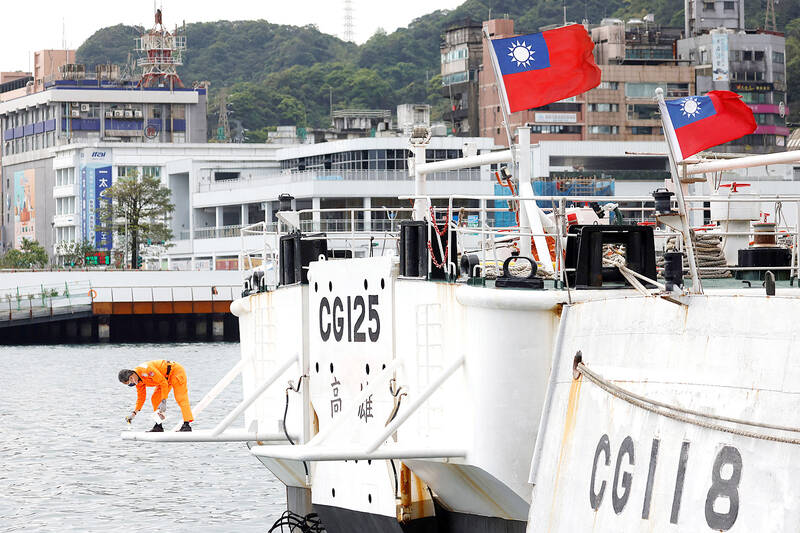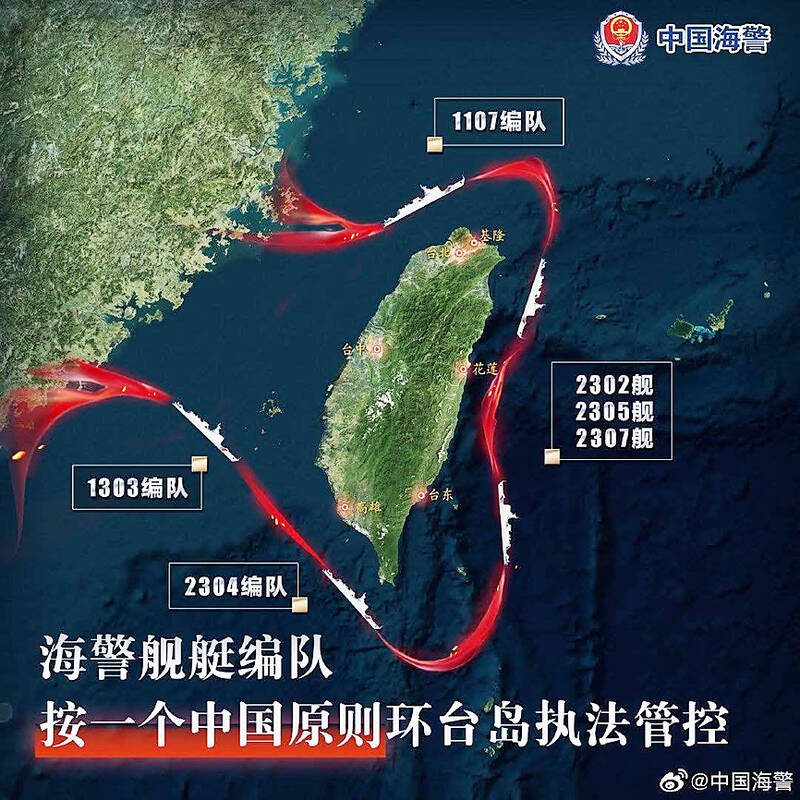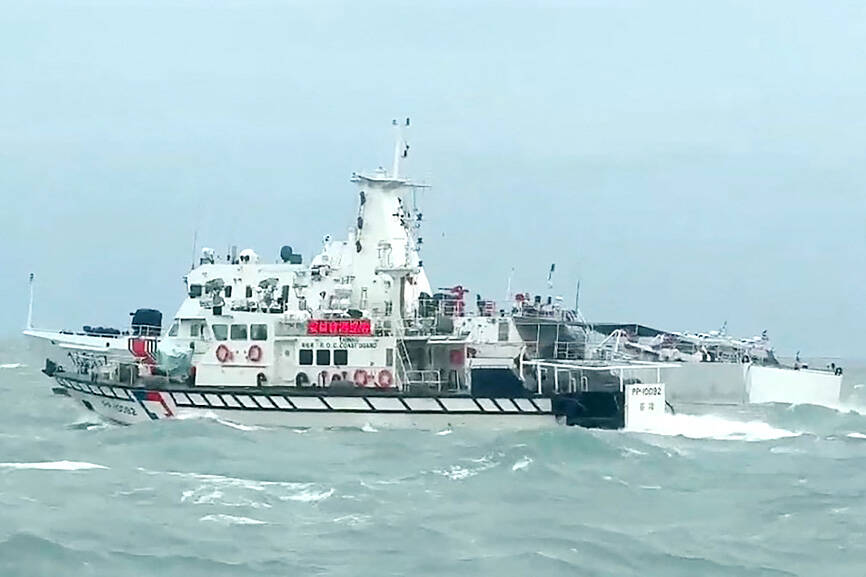China could find a “pretext” to stage new war games around Taiwan this year, coinciding with sensitive dates such as the anniversary next month of a year since President William Lai (賴清德) took office, Coast Guard Administration (CGA) Deputy Director-General Hsieh Ching-chin (謝慶欽) said yesterday.
China yesterday began military exercises around Taiwan, which it said was to “serve as a stern warning and powerful deterrent against Taiwanese independence.”
However, China not give a name to those drills, unlike two war games last year that it dubbed “Joint Sword-2024A,” which was in May, following Lai’s inauguration, and “Joint Sword-2024B” in October, after his Double Ten National Day speech.

Photo: Carlos Garcia Rawlins, Reuters
Meanwhile, the China Coast Guard yesterday said that it conducted “law enforcement patrols” around Taiwan.
Beijing’s pretext could include “special occasions” such as diplomatic events or incidents related to Taiwan’s sovereignty, Hsieh said.
He said that there were two key dates this year around which China could either launch named war games — “Joint Sword-2025” — or what he called “de facto” drills.

Photo from Chinese social media
Apart from the anniversary next month, these include August, when China ends a routine annual ban on fishing, ostensibly to protect fish stocks, and National Day on Oct. 10, when Lai is expected to give a keynote speech, Hsieh said.
Neither the Chinese Ministry of National Defense nor China’s Taiwan Affairs Office responded to requests for comment on the likelihood of such war games.
A separate source, a senior Taiwan security official, said that the assessments were based on experience and Chinese actions, adding that China this year could seek “excuses” to hype up its “gray zone” pressure on Taiwan on those sensitive dates.

Photo: Coast Guard Administration (Taiwan Coast Guard) / AFP
However, Beijing faces a “dilemma” in balancing its “gray zone” aggression on Taiwan while avoiding blowback internationally, the security official said.
“On one hand they want to exert extreme pressures on Taiwan, but on the other hand they must be extremely careful not being labelled as an aggressor internationally,” they said.
The CGA is heavily involved in Taiwan’s response to Chinese military drills and civilian “gray zone” activities such as illegal fishing in its waters, and CGA ships now support the navy in shadowing Chinese warships during drills.
In case of war, the CGA would be pressed into service and ships armed to help defend against a Chinese attack.
Hsieh said that Taiwan has been alarmed by a recent uptick in Chinese activities around Pratas Island (Dongsha Island, 東沙島), an atoll protected as a marine reserve that lies strategically at the top of the South China Sea.
China also claims Pratas Island and its coast guard ships have entered the atoll’s restricted waters several times this year, actions denounced by Taipei as “coercive harassment.”
The China Coast Guard has no publicly available media contacts.
Outlining a new response strategy, Hsieh said that the CGA would evaluate the Philippines “transparency” policy to give details on China’s actions to draw greater international attention.
Additional reporting by AFP

Several Chinese Nationalist Party (KMT) officials including Chairman Eric Chu (朱立倫) are to be summoned for questioning and then transferred to prosecutors for holding an illegal assembly in Taipei last night, the Taipei Police said today. Chu and two others hosted an illegal assembly and are to be requested to explain their actions, the Taipei City Police Department's Zhongzheng (中正) First Precinct said, referring to a protest held after Huang Lu Chin-ju (黃呂錦茹), KMT Taipei's chapter director, and several other KMT staffers were questioned for alleged signature forgery in recall petitions against Democratic Progressive Party (DPP) legislators. Taipei prosecutors had filed

Taiwan would welcome the return of Honduras as a diplomatic ally if its next president decides to make such a move, Minister of Foreign Affairs Lin Chia-lung (林佳龍) said yesterday. “Of course, we would welcome Honduras if they want to restore diplomatic ties with Taiwan after their elections,” Lin said at a meeting of the legislature’s Foreign Affairs and National Defense Committee, when asked to comment on statements made by two of the three Honduran presidential candidates during the presidential campaign in the Central American country. Taiwan is paying close attention to the region as a whole in the wake of a

President William Lai (賴清德) has appointed former vice president Chen Chien-jen (陳建仁) to attend the late Pope Francis’ funeral at the Vatican City on Saturday on his behalf, the Ministry of Foreign Affairs said today. The Holy See announced Francis’ funeral would take place on Saturday at 10am in St Peter’s Square. The ministry expressed condolences over Francis’ passing and said that Chen would represent Taiwan at the funeral and offer condolences in person. Taiwan and the Vatican have a long-standing and close diplomatic relationship, the ministry said. Both sides agreed to have Chen represent Taiwan at the funeral, given his Catholic identity and

NEW WORLD: Taiwan is pursuing innovative approaches to international relations through economics, trade and values-based diplomacy, the foreign minister said Taiwan would implement a “three-chain strategy” that promotes democratic values in response to US tariffs, Minister of Foreign Affairs Lin Chia-lung (林佳龍) said. Taiwan would aim to create a “global democratic value chain,” seek to capitalize on its position within the first island chain and promote a “non-red supply chain,” Lin was quoted as saying in the ministry’s written report to the Legislative Yuan submitted ahead of the legislature’s Foreign Affairs and National Defense Committee meeting slated for today. The Ministry would also uphold a spirit of mutual beneficial collaboration, maintaining close communication and consultations with Washington to show that Taiwan-US cooperation